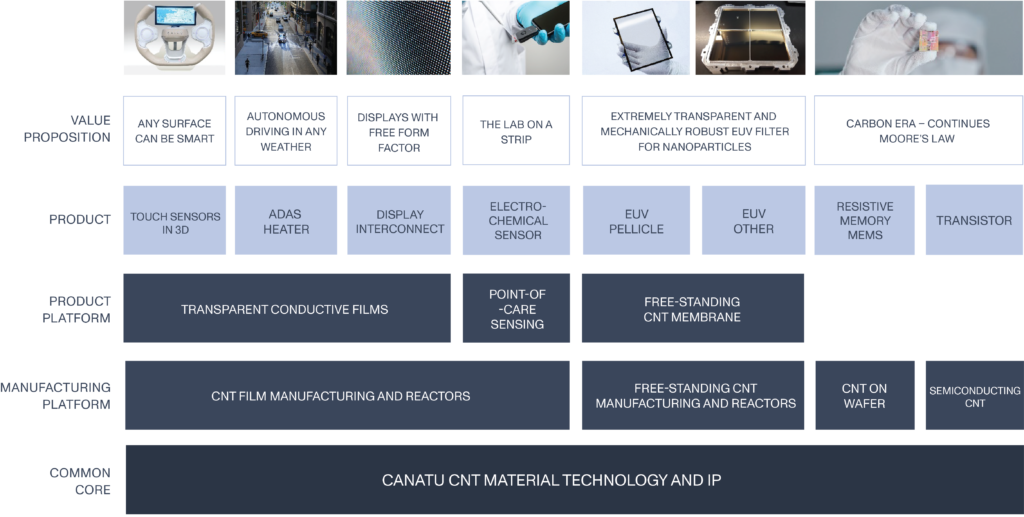Pushing the boundaries of innovation with fully-owned IPR
Canatu has full control over the manufacturing and development of Canatu carbon nanotubes (Canatu CNT). Owning the intellectual property rights (IPR) gives us a fruitful platform and freedom to innovate. Since the inception, we have systematically developed our patent portfolio to create essential protection for the Canatu CNT material itself, its manufacturing, synthesis and post-processing processes as well as different applications. As of 2022, Canatu holds over 150 patents and pending in 25 different categories.
“We are steadily moving towards a world that will depend on carbon based solutions for progress. By maintaining an extensive IPR portfolio, we not only drive growth and innovation for the company, but also ensure that we hold a significant stake in the future.”
Ilkka Varjos, CTO of Canatu
Controlling the entire process gives us an advantage to advance Canatu CNT and develop applications with partners, and we continue to push boundaries every day, developing Canatu CNT for new applications and customers.
Currently, Canatu is on track to double its annual patents filed compared to previous years, signaling an upward trend in novel breakthroughs that are likely to achieve commercial success. This has been made possible largely due to Canatu’s continuous drive to innovate, as exemplified by the company’s employee invention policy that incentives the creation of solutions that can be protected by a patent and/or utility model.
IPR is the backbone of Canatu
Broad IPR portfolio ensures that Canatu can protect its innovations and unique processes, whilst also providing advantageous business opportunities in the form of licensing arrangements with third parties.
Canatu’s portfolio can be contrasted with other companies that only retain the IPRs over an individual aspect of the production process, e.g. their own nanomaterial or one step in the manufacturing process. In this case, a company with its own proprietary CNT powder would need to rely on third party companies to carry out other aspects of the manufacturing process to bring a product to market. Conversely, Canatu’s IPR portfolio protects everything from our manufacturing and product platforms to the final product. For example, Canatu has developed its own unique manufacturing processes in-house, including its patented dry deposition method which reduces the number of steps to make deposits whilst increasing the overall quality and performance of the final product.
As Canatu enters new applications this requires the development of novel solutions which can often be patent protected. This strengthens Canatu’s IPR position in the domain.

With its extensive IPR portfolio, Canatu is able to:
- use its owned patents to manufacture and market products
- license the patent to third parties in exchange for certain upfront payments, royalties, or other mutually beneficial arrangements
- potentially enforce the patent against infringes of the portfolio
Furthermore, in the context of attracting potential investors, factors such as a company’s technology, patent portfolio, technical and professional expertise, and the value of its company’s intellectual assets are key considerations.
Thus, Canatu’s broad IPR portfolio brings with it the intangible value of making new innovations and breakthroughs possible, along with tangible commercial outcomes that benefit the company and its many stakeholders.
The global nanotechnology market size was valued at $1.76 billion in 2020 and is projected to reach $33.63 billion by 2030 according to a study carried out by Allied Market Research. With this promising economic outlook, R&D has been rapidly increasing in this industry. Companies must therefore utilize patents to protect their intellectual property rights (IPRs). This allows them to most effectively commercialize their laboratory results and bring allows new innovations to market.
Patents are ultimately a legal tool that recognizes and rewards inventors for their valuable inventions by providing them with tangible incentives. Particularly in the context of application related technology, patents provide companies the freedom to operate to find niche solutions. This allows companies to develop, make and eventually market products without the risk of infringing on third party IPRs that could lead to costly legal ramifications.
Contact

Send us a message and we will get back to you soon.
About Canatu
Canatu is a carbon nanomaterial developer creating the most advanced carbon nanotubes for industry-transforming products. The Canatu carbon nanotube (CNT) technology has been created with a unique process that ensures the required versatility and reliability for highly engineered solutions. Canatu partners with forerunner companies, together transforming products for better tomorrows with nano carbon. The company’s focus is in the automotive and semiconductor industries with the portfolio’s core spanning from ADAS heaters to 3D touch sensors and to EUV membranes. The experts at Canatu think big and create impacts on the tiniest scale – nano solutions for massive impact. Canatu’s headquarters are in Finland with sales offices also in the US, Japan and Taiwan.